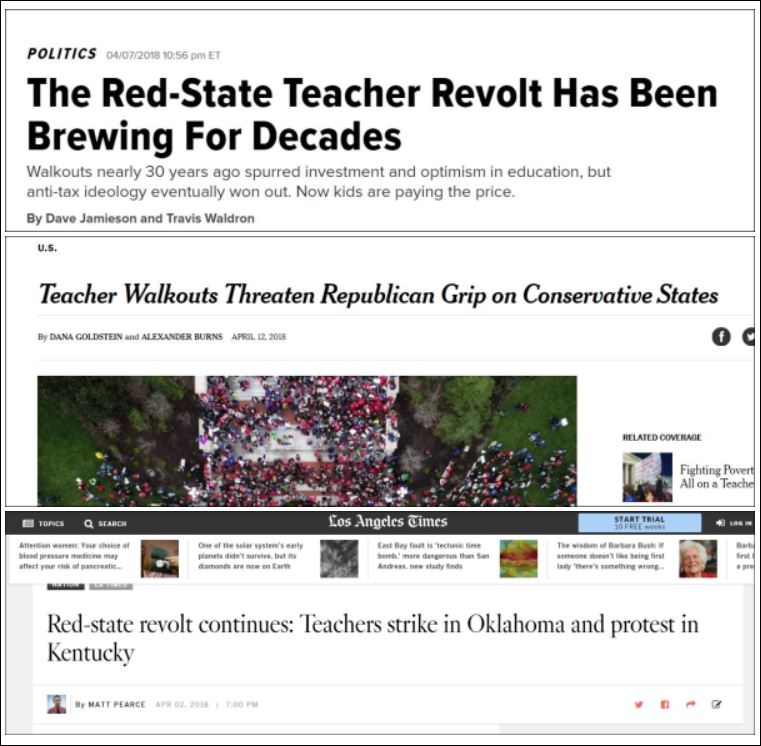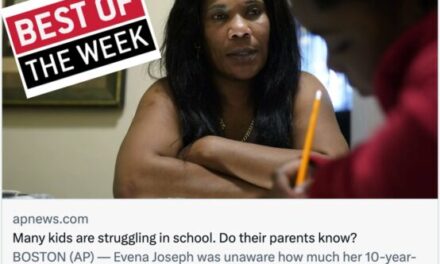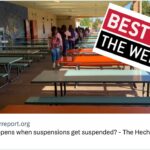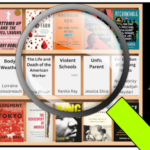THE BEST OF THE WEEK
The best education journalism of the week was Leila Fadel’s NPR segment, Turning rampant anti-Muslim bullying into teachable moments, which describes how a Muslim family near San Jose “pushed back against bullying and intimidation, at school and the local political arena.”
It’s a feel-good piece, sure, but with a pragmatic sensibility. It’s holistic, describing the experiences of a Muslim student and a teacher who have been bullied at school. (The teacher being bullied was profiled last fall by Sharon Noguchi in the San Jose Mercury News. She is now a member of the Franklin-McKinley School District school board.) None of the story subjects are presented as victims. There’s nuance. (One of the schools at the center of the story is majority nonwhite.) And it’s a story that lots of other education reporters and outlets might emulate. (A Muslim nonprofit, ING, has developed an inclusion education program for schools.)
The piece is part of Muslims In America: A New Generation, NPR’s six-part series (look for the hashtag #nextgenMuslims) which is being cross-published by National Geographic. Want more? Fadel did a Reddit “Ask Me Anything” you can read here.
HONORABLE MENTIONS
NATIONAL SCHOOL WALKOUT
🏆 NPR: Meet The Students Who Dreamed Up Friday’s National School Walkout
🏆 WNYC: NYC schools chancellor implores city students not to walk out on Friday.
PARKLAND
🏆 USA Today: Wells Fargo loses teachers union AFT over ties to NRA, guns
🏆 EdWeek: Parents Lash Out at School District Over Parkland Shooting
URBAN NAEP COVERAGE
🏆 EdWeek: NAEP: Urban School Districts Improving Faster Than the Nation
🏆 Baltimore Sun: Baltimore students score near bottom in reading, math on key national assessment
🏆 Cleveland Plain Dealer: Vast poverty differences create unfair comparisons on Nation’s Report Card
🏆 Miami Herald: Miami and Florida students outperform peers on national test
INEQUALITY
🏆 Washington Post: D.C. is misspending millions of dollars intended to help the city’s poorest students
🏆 Pacific Standard: How White Women Kept Jim Crow Alive
🏆 Washington Post: D.C. Public Schools residency fraud often committed by teachers
🏆 Mother Jones: Parents Didn’t Want Fracking Near Their School
POLITICS
🏆 Chalkbeat: Walton memo recommends charter advocates do more to persuade Democrats
🏆 Daily Signal: Latest NAEP Scores Show DeVos Was Right About Public Schools
🏆 Sacramento Bee: Charter school backers spend millions to support Villaraigosa for governor
🏆 Chalkbeat: Candidates backed by powerful coalition sweep Newark’s historic school board election
🏆 LA Times: The power game behind the search for a new L.A. schools leader
🏆 Chalkbeat: CO Democrats overwhelmingly reject Democrats for Education Reform at state assembly
EDTECH
🏆 NYT: Maryland Schools May Tell Children When It’s Time to Log Off
🏆 Gizmodo: Pearson Embedded a ‘Social-Psychological’ Experiment in Students’ Educational Software
🏆 The Verge: OLPC’s $100 laptop was going to change the world — then it all went wrong
HOW GOOD WAS THE OKLAHOMA WALKOUT COVERAGE?

Pictured: Mainstream headlines about Oklahoma teacher walkouts, many of which emphasized the partisan political nature of the debate.
For this week’s column, I took a look back at two weeks of national reporting on the Oklahoma walkouts and how they were covered. What I found was that coverage was abundant, but overly focused on a political narrative that Oklahomans didn’t feel was particularly relevant.
As you’ll see, some of the criticism came from the political left. “The national media has largely erased the role of communities of color… that drove these walk-outs,” The Guardian’s Mike Elk wrote. (I am embarrassed to report that my piece reflects the same flaw, including the voices of just one woman and no people of color.) Other concerns came from the moderate center. What happened in Oklahoma simply “wasn’t a progressive pushback,” according to Ben Felder. “It wasn’t the left-of-center crowd rising up.”
Not everyone was buying it. The Intercept’s Rachel Cohen noted that “as someone who did both an in-depth piece on Oklahoma’s teacher uprising and a more recent story comparing political dynamics [among states] I don’t think these media criticisms hold much water.”
Others might argue that I was being too kind. Mike Antonucci’s account of the Oklahoma walkouts in The 74 makes mainstream coverage look awfully flattering. And AEI’s Rick Hess made a smart point that the eye-popping 30 percent number being used to represent education spending cuts in Oklahoma overstates the cuts to actual student spending.
MEDIA TIDBITS

Pictured: The NYT’s Reader Center produced one of this week’s most-shared education stories (about the conditions of public schools).
CURRENT EVENTS
📰 SCHOOL SHOOTINGS IN CONTEXT: Kudos to John Woodrow Cox and Steven Rich for producing a lovely new piece about the number of kids who’ve been exposed to school gun violence since Columbine, and for considering my feedback that the story would be stronger if it gave readers some context (ie, a denominator) rather than just the raw number.
📰 REMEMBERING COLUMBINE: The irony of today’s Columbine anniversary protests (and the coverage they are likely to generate) is that, as Dave Cullen has pointed out, what happened there was less a school shooting than a failed school bombing.
📰 DO NOT ARREST: In the two months since Parkland, the district and the liberal media “have repeatedly claimed that Broward’s policy to not arrest students had NOTHING to do with Cruz not getting arrested,” according to the Weekly Standard’s Alice Lloyd. Meanwhile, EdWeek reported on a community meeting at which the failure to address the shooter’s needs before he hurt anyone was a common complaint.
STORY IDEAS & STRATEGIES
📰 PENSION-FUELED LAYOFFS: Are teachers getting laid off because of rising pension obligations? That’s what this NYT story says: “The Beaverton School District, outside Portland, had to get rid of 75 teachers last year when its mandatory pension contribution rose by $14 million. That was after shedding 340 teachers in 2012.” The Oregonian reported on the phenomenon last summer: Oregon schools cut staff and programs despite big budget increases. And the Omaha World-Herald recently reported that Omaha schools were mulling $26 million in cuts due in no small part to pension obligations.
📰 HOUSING MATTERS: Evictions have become so common that, as this NYT story notes, some school systems like Richmond, VA have figured out how to reroute buses “to follow children from apartments to homeless shelters to pay-by-the-week motels.” I’m sure there are others and would love to see more reporting about this.
📰 NYT’S READER CENTER: This week’s much-discussed NYT story on school conditions (image above) was part of the outlet’s Reader Center initiative, in which readers share their stories and the Times curates them. They got 4,200 responses for this outing. Another story about teachers is in the works.
📰 READER-BASED REPORTING: On a similar note, Chicago public radio’s “Curious City” project (reporting based on reader questions) has generated at least two vivid school-related stories that I know of (about school improvement and school swim requirements). Has anyone else tried this approach to generating great stories more frequently?
COMPLAINT DEPARTMENT
📰 CHARTS AND GRAPHS ARE NOT ENOUGH: Activist Deray McKesson generated 1,700 retweets and likes with his comment that “It’s exhausting to see so many reporters write about education with no proximity to actual school systems, or classrooms. Graphs & charts aren’t enough.”
📰 EVERYONE WANTS YOU TO STOP: “This conversation about whether or not to arm teachers is really a distraction,” says 2017 National Teacher of the Year Sydney Chaffee. Agreed. But media outlets like NPR can’t seem to stop covering it.
📰 SHYING AWAY FROM GRAPHIC IMAGES: The Sun Sentinel and several other media organizations filed a lawsuit asking for video outside the school to be released in the public interest. However, “attorneys for the media organizations seeking the release stressed that they did not want to obtain videos showing victims.”
📰 SCHOOL SHOOTINGS, SHARK ATTACKS, AND AIRPLANE CRASHES: Vox and EdWeek were among those who wrote up the Pew survey results on fears of school shootings but neglected to note that such events are relatively rare.
📰 WINDY CITY WHIPLASH: One day, Chicago Public Schools get featured on the PBS NewsHour for its successes and progress, the next day it gets slammed in a WBEZ Chicago Public Radio piece describing the state’s findings that the district failed to provide adequate special education services.
PEOPLE, JOBS, & AWARDS

Pictured: Some of the journalists who are scheduled to participate in next month’s Atlantic education summit.
🔥 Congrats to current and former BaltSun reporters Liz Bowie and Erica Green for winning a National Headliner Award for their series on school segregation. The duo earned first place in the education writing category for their series “Bridging the Divide: The struggle to move past segregated schools.”
🔥 Speaking of the Baltimore Sun, be sure to follow Talia Richman (@TaliRichman), who’s covering education at the BaltSun since last summer. Start with her look at how Baltimore’s free lunch program unintentionally led some poor schools to lose Title I funding.
🔥 Big congrats to Zahira Torres and the entire newsroom on the occasion of the El Paso Times winning a top award for its investigative report on a shady El Paso Independent School District contract.
🔥 Congrats to the current and former Chicago Tribune reporters (including Diane Rado) whose work on “Shrinking Schools” just got nominated for a prestigious Illinois journalism award. Congrats also to the Rockford Register Star’s Corina Curry on being nominated for Best Investigative Reporting, circulation less than 100,000 for her story “Racial inequities in education.”
🔥 RJI fellow Nicolette Gendron, a freelance writer and strategist at The New York Times, will evaluate the barriers to news access at small-town high schools while in residence at the Missouri School of Journalism.
🔥 Emmanuel Felton, Kristina Rizga, Liz Willen, Alia Wong, & Ron Brownstein are among the journalists scheduled to speak at The Atlantic’s May 1 Education Summit. Lucky dogs. Should be interesting.
🔥 “Sully was just a hero,” notes The 74’s Bev Weintraub in a Washington Post oped. “So why label the Southwest captain a “female pilot”?
EVENTS, DEADLINES, & ANNOUNCEMENTS
⏰ There was an AERA panel held earlier this week that aimed to describe how nonprofit outlets “complement, supplement, and influence news coverage.” Journalists who participated included Sarah Dockery Sparks (EdWeek), Matt Barnum (Chalkbeat), Sarah Carr (Teacher Project), and Sarah Garland (Hechinger Report).
⏰ ICYMI: The preliminary agenda for the May 16-18 EWA 71st National Seminar in Los Angeles is now online. View it here. What do you think?
⏰ Boston University’s Data-Driven Storytelling Workshops are taking place June 4-8. Register here.
⏰ Registration is open for the 2018 Online News Association Conference taking place Sept. 13-15 in Austin, Texas. Register now to catch the early-bird rate.
KICKER

According to this AP story, a group of former high stoners who called themselves The Waldoes lay claim to having invented the annual celebration of all things cannabis. Pot holiday traces roots to 5 California high school stoners.
This is the web archive version of the weekly newsletter, Best of the Week, which comes out on Fridays. Sign up here to get it first.
ABOUT THE AUTHOR

Alexander Russo
Alexander Russo is founder and editor of The Grade, an award-winning effort to help improve media coverage of education issues. He’s also a Spencer Education Journalism Fellowship winner and a book author. You can reach him at @alexanderrusso.
Visit their website at: https://the-grade.org/













